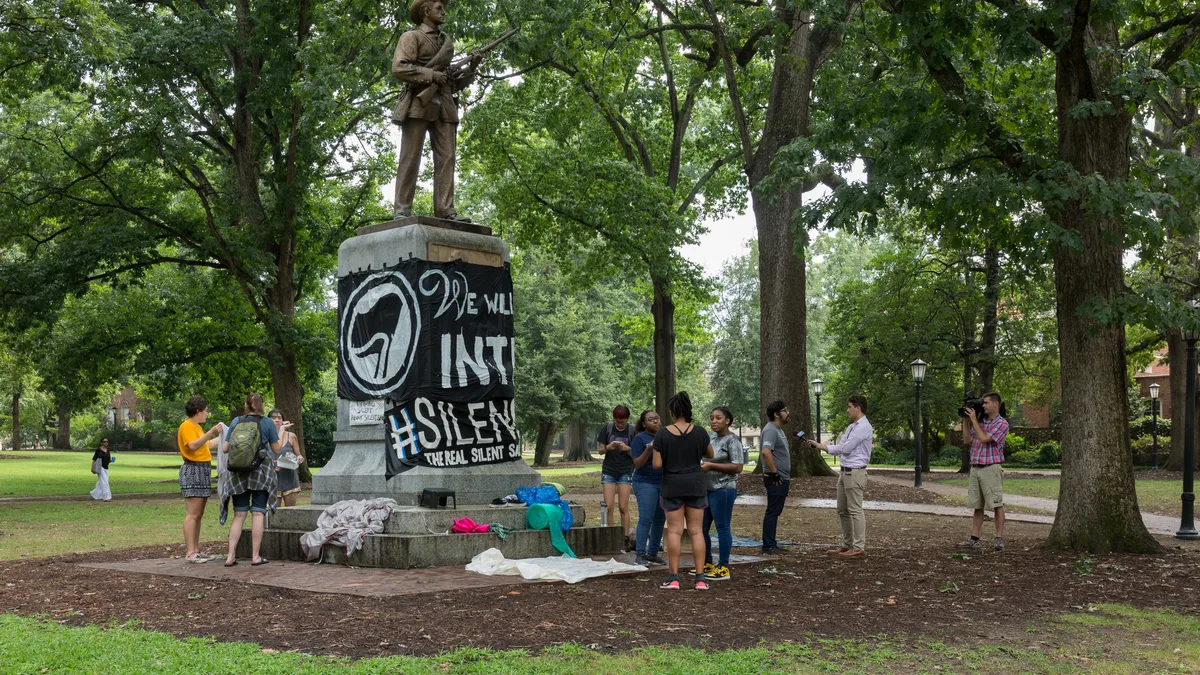Dive Brief:
- The University of North Carolina System Board of Governors rejected a plan Friday to relocate the controversial Silent Sam Confederate statue at UNC-Chapel Hill to a $5.3 million history center that would have been built near the edge of campus. Chair Harry Smith said the board could not support the proposal out of concerns over public safety and its multimillion dollar price tag.
- Several system board members will work with UNC-Chapel Hill Chancellor Carol Folt and its Board of Trustees to review recommendations about what to do with the statue and to come up with a revised proposal by March 15. "The goal here is nothing more than to get it right," Smith said.
- The board also passed a motion to direct the system's Committee on University Governance to review existing policies about student, staff and faculty conduct and propose minimum sanctions — including suspension, termination and expulsion — for individuals found engaging in unlawful activity that affects public safety. That includes assaulting or disobeying law enforcement, resisting arrest, and inciting or participating in a riot.
Dive Insight:
The trustees' proposal to house the statue on campus prompted a strike of dozens of teaching assistants and instructors and sparked backlash well beyond the Chapel Hill campus.
The strikers had vowed to withhold grades until the college scrapped the proposal and held listening sessions with the community. In a letter of solidarity with the strikers, graduate students contended that keeping the statue on college grounds "elevates a symbol of white supremacy" and poses a risk to campus safety.
The plan also drew ire for its recommendation to create a 40-person "mobile force platoon" to help manage protests across the 17-campus system. The force would have cost $2 million annually and require $500,000 in equipment costs.
Last week, university administrators threatened the strikers with "serious consequences" if they carried out with their plan to not submit final grades, The News & Observer reported. In response, a group of faculty, instructors and teaching assistants, some of whom were participating in the strike, penned an open letter to the parents of the students who could be affected, writing that education was about more than just grades.
More than 700 professors from colleges across the U.S. backed the decision to strike, joining UNC-Chapel Hill faculty in an open letter to the college's leadership. "[We] support the right of our graduate and post-undergraduate students to speak out against injustice and intolerance in all of its forms," they wrote. "Universities must remain places committed to protecting and fostering students, not to suppressing their right to speak freely and to dissent."
Current and former UNC-Chapel Hill student-athletes also decried the proposal in an open-letter, writing that "white supremacy has no place on our campus." And hours before the board's decision on the matter, another group of former UNC athletes, including prominent figures such as Jerry Stackhouse and Vince Carter, issued a similar statement that called the proposal "embarrassing."
Their statements joined at least 20 others that came out recently against housing Silent Sam on campus, according to The News & Observer.
At UNC-Chapel Hill, the Faculty Council urged the university to forgo the plan and allow council-appointed faculty members to weigh in on future discussions about what to do with the statue.
The decades-long debate over Silent Sam, which was erected in 1913 to honor UNC alumni who were Confederate soldiers that died during the Civil War, came to a head when protestors toppled the statue in August.
Many have since been in favor of relocating the statue off campus, but university leadership has said their hands are tied over a 2015 state historic preservation law that requires monuments like Silent Sam to be returned to either their original location or a place of similar significance.











